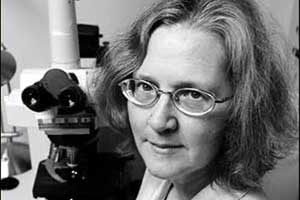 Liz Blackburn, the 2009 Nobel Prize Winner in Medicine or Physiology
Liz Blackburn, the 2009 Nobel Prize Winner in Medicine or Physiology
I have been running a science book club (DtaS book club) for the past couple years. Last month, we read our first biography, that of Liz Blackburn, the 2009 Nobel Laureate in Medicine from UCSF. The book, available freely online via Google Books, recounts Liz's meteoric rise in the scientific community, essentially birthing the study of telomeres - the end caps of chromosomes. Her work revolved around greater understanding of telomerase, the enzyme which is involved in the lengthening and shortening of these end caps. The process is complicated and not fully understood, but the basic (and oversimplified) idea is that as cells divide - the ends of chromosomes shorten leading to their eventual death. Telomerase helps repair and lengthen these end pieces of DNA, affecting the life span of cells. This has implications in aging, cancer research, even correlations to quality of life. Liz came off as the heroine in this tale - she played the role of the curious scientist that fully committed to understanding the role of a specific biological system. Alongside a small group, Liz pioneered study in this area, leading to an explosion of research in this field.
The tale of her scientific discovery is riveting, but nearly as fascinating as her personal tale. Liz is the only the 8th woman to win the Nobel Prize, indicative of the gender gap in scientific research. I was personally struck by a particular comment in the book: At 38, Liz had become a full professor at UC Berkeley and attained great respect within the field - she had finally "achieved enough to have a child". This struggle is oft-discussed and debated within the science world, but I was absolutely struck by the brutal honesty of Liz's quote.
Even though Liz is widely seen as one of the most polite and thoughtful scientists you'll ever meet, she has found herself in the midst of many controversies. One in particular lead to great deal of fame, her widely publicized dismissal from President George W. Bush's Council on Bioethics in 2004. This council was charged with making recommendations on policy surrounding embryonic stem cell research, but was often criticized by the scientific community for advancing the political agenda of the administration. Liz details her side of the story in an editorial to the New England Journal of Medicine, citing her frequent disputes with the chairman of the council, whom she accused of ignoring comments and input from the scientist council members.
Liz will be in conversation with Susan Desmond-Hellman, the current Chancellor of UCSF, at the Commonwealth Club. Sue is certainly no stranger to this conversation - she is widely considered one of the foremost experts on cancer research today. Sue was formerly president of product development at Genentech and was involved the development of Herceptin and Avastin - two of the most effective cancer drugs on the market today.
